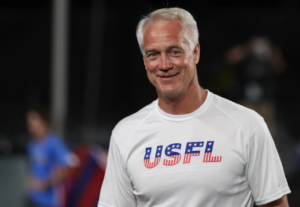
Daryl Johnston, a former American football player and current sports analyst, recently made headlines by discussing the disappointing attendance figures for the United Football League (UFL). In his commentary, Johnston pointed to Caitlin Clark, a prominent college basketball player, as a comparison to highlight the UFL’s struggles in attracting fans. Let’s delve into the context of Johnston’s comments, the relevance of Caitlin Clark’s popularity, and what it all means for the UFL.
Background on Daryl Johnston and the UFL
Daryl Johnston is well-known in the world of American football. He had a successful career as a fullback with the Dallas Cowboys, where he was a key player in their three Super Bowl victories during the 1990s. After retiring as a player, Johnston transitioned into broadcasting, becoming a respected sports analyst and commentator.
The United Football League (UFL) was established with the aim of providing more opportunities for professional American football players and offering fans an alternative to the NFL. Despite its ambitious goals, the UFL has struggled to gain traction and maintain consistent attendance numbers at its games. This struggle has been a topic of concern for both the league’s management and fans alike.
Caitlin Clark is a standout college basketball player for the University of Iowa. Known for her exceptional skill on the court, Clark has garnered significant attention and popularity. She has been praised for her scoring ability, vision, and leadership, making her one of the most celebrated players in women’s college basketball.
Clark’s popularity is not just confined to basketball enthusiasts; she has attracted a broad audience due to her exciting playing style and charismatic personality. This widespread admiration has translated into high attendance at her games and substantial media coverage. Her influence extends beyond the court, as she has become a role model for young athletes and a symbol of the growing recognition of women’s sports.
In his commentary, Daryl Johnston used Caitlin Clark as a benchmark to underscore the UFL’s difficulties in drawing fans to their games. Johnston’s comparison highlights a few critical points:
Popularity and Engagement**: Caitlin Clark’s ability to attract large crowds and engage fans illustrates a high level of popularity and excitement. Johnston implied that if a college basketball player like Clark can generate such enthusiasm, it raises questions about why a professional football league like the UFL struggles to do the same.
Marketing and Appeal**: Clark’s success and the strong attendance at her games suggest that effective marketing and appealing to fans’ interests are crucial. Johnston’s use of Clark’s popularity as a comparison might be pointing out that the UFL has not managed to create a similar level of interest or excitement around its games.
Fan Experience and Value**: Fans are often drawn to sports not only for the games themselves but also for the overall experience. Johnston’s comments might be suggesting that the UFL has yet to provide an engaging and valuable fan experience that resonates with the audience in the way Clark’s games do.
ges Faced by the UFL**Several factors contribute to the UFL’s attendance issues, and Johnston’s comparison with Caitlin Clark brings these challenges into focus:
Competition from Established Leagues**: The NFL is the premier American football league and dominates the sports landscape. Competing with such a well-established league presents a significant challenge for the UFL. Fans often prefer watching games from leagues with high levels of competition and star players, making it hard for newer leagues to attract attention.
Brand Recognition and Legacy**: The UFL lacks the historical legacy and brand recognition that leagues like the NFL or even college basketball programs have. Building a strong brand and a loyal fan base takes time and substantial investment, something the UFL has struggled with.
Financial Constraints**: Financial issues can impact every aspect of a sports league, from marketing and promotion to the quality of the games and facilities. The UFL’s financial constraints may have limited its ability to attract top talent, create high-quality
Viewer Preferences and Media Coverage**: The media plays a significant role in shaping sports fans’ preferences. Caitlin Clark’s games receive substantial media coverage, boosting her visibility and drawing more fans. In contrast, the UFL has faced challenges in securing similar media attention, impacting its overall visibility and appeal.
For the UFL to improve its attendance figures and overall success, several steps could be considered:
Enhanced Marketing and Promotion**: Learning from Caitlin Clark’s success, the UFL could focus on more aggressive and strategic marketing. Highlighting unique aspects of the league and creating compelling narratives around players and teams might help in attracting fans.
Investing in Fan Experience**: Creating a memorable and engaging fan experience is crucial. This includes improving game-day experiences, offering interactive elements, and building a strong community presence.
Building Partnerships**: Partnering with media outlets and other organisations could increase visibility and attract more fans. Collaborations with local businesses, schools, and community organisations might also help in building a stronger local following.
Focusing on Quality and Competitiveness**: Ensuring high-quality games and competitive play can make the UFL more appealing. Investing in player development and maintaining high standards of play will be essential for long-term success.
Daryl Johnston’s use of Caitlin Clark’s popularity as a point of comparison highlights the UFL’s current struggles with attendance and fan engagement. By examining Clark’s success and the factors that contribute to it, the UFL can gain insights into improving its own strategies and attracting more fans. While the UFL faces significant challenges, there are opportunities for growth and improvement. By learning from successful models in sports and addressing its own issues, the UFL can work towards creating a more compelling and engaging football league.